Even after many years of varying diet trends, the keto diet is still around. Is there a place for the keto diet for kidney disease?
With stage 3, stage 4, transplant or any other stage of kidney disease, there are important factors to consider when it comes to a diet- ketogenic or not.
Let’s dive into what the keto diet for ckd patients is all about!
Table of Contents
What is the ketogenic diet?
The ketogenic diet was originally proposed in the 1920s. It was created as a medically-prescribed diet to help those with epilepsy control. The diet began to be studied with different nutritional parameters of the macronutrients. Macronutrients are carbohydrates, fats, and proteins.
The ketogenic diet gets its name from the effect of turning the body to ketosis to create energy.
This happens when carbohydrate sources are gone and the body is looking for a new source of energy. This energy source comes from the breakdown of fats.
What is ketosis?
Ketosis is when your body uses fat instead of carbohydrates for your metabolism. Ketone bodies are created in the liver from the breakdown of fat to be used as energy for the body.
In order for a person to be in a state of ketosis, the keto diet focuses on a high-fat, very-low-carbohydrate diet to supply energy. The state of ketosis is a normal response when there is not enough glucose available in the body.
The body uses glucose as its main source of energy. Therefore, too much protein or carbohydrates will prevent ketosis from occurring.
How do I know if I’m “in ketosis?”
There are different types of tests that you can take to determine what source of fuel your body is using.
Using either your blood, breath, or urine, you can measure the amount of ketones that are being produced by the body. The range for ketone levels for safe ketosis is between 0.5 – 3.0 mmol/L.
Macronutrients of the keto diet
The ratio of nutrients that are in the keto diet are quite different from the standard healthy eating guidelines.
| Type of Diet | Carbohydrate | Protein | Fat |
| General Healthy Guidelines (USDA) | 45-65% | 10-35% | 20-35% |
| Ketogenic Diet | 5-10% | 10-20% | 70-80% |
| Traditional Atkins Diet | 5-10% | 20-30% | 60-70% |
| Modified Atkins Diet | 10-15% | 20-40% | 55-65% |
There can be some flexibility on the percentages of protein and fat, but rarely carbohydrates.
In the keto diet, the carbohydrate intake per day should remain below 20 grams. Therefore, the carbs in a keto diet could look like just an apple (15 grams of carbohydrates) for the day.
The Atkins diet, a variation of the ketogenic diet, is similar in nutritional breakdown of macronutrients compared to the keto diet. However, the main difference between keto and Atkins diet is that the Atkins diet is significantly higher in protein than the keto diet.
Foods allowed on the keto diet
The ketogenic diet is one of the more restrictive diets as it eliminates a carbohydrates, the main source of energy.
Examples of foods that are commonly found in a keto diet include;
- Cheese
- Seafood
- Butter
- Meat and poultry
- Eggs
- plant oils
- Cream
- Avocados
- Low-carb veggies (onions, peppers, kale, etc)
Most people who say they follow a ketogenic diet are likely not in true ketosis. That requires at least 2 days but up to weeks of following a strict diet just to use up the glucose stores and enter the process of ketogenesis.
In other words, there can be no such thing as a “cheat day” on a keto diet. In those cases, the diet is likely more of a low-carb, moderate to high-protein and/or high fat diet.
Foods not allowed on the traditional keto diet
As with many diets, there are foods that will not be allowed on a keto diet. Examples of foods to avoid include:
- Sodas or higher-carb beverages like hot chocolate and juice
- Breads and tortillas
- Grains like rice, cereal, and pastas
- Most fruits, especially dried fruits
- Starchy vegetables like potatoes, peas, and corn
- Beer and some liquors
- Flavored yogurts
- Beans and legumes
- Sugar, honey, agave nectar, and maple syrup
As a result, many people struggle with following a keto diet for a long period of time due to these restrictions.
Side effects of keto diet
Several things can happen when on a keto diet that can be unappealing.
An early onset side effect of the keto diet is called “the keto flu.” This can include low energy, brain fog and headaches.
For many people, constipation can be a common side effect due to the restriction of carbohydrates. While low-carbohydrate vegetables are a part of a ketogenic diet, many tend to lean towards including more fats like butter and bacon.
Other side effects that can occur from a ketogenic diet include;
- Reflux
- Changes in gut health/microbiome
- Abnormal lipid values
- Low blood sugar
- Low blood pressure
- Nausea/vomiting
- Diarrhea
- Dehydration
Nutritional Deficiencies
The diet focuses on high-fat foods and severely restricts the intake of carbohydrate foods, such as fruits, vegetables, legumes, and dairy. Therefore, there is a higher risk for nutritional deficiencies.
These deficiencies can include B vitamins (often found in fortified whole grains and produce), calcium (found in dairy and dark greens), vitamin D, and electrolytes like potassium.
Fat-soluble vitamins A and E along with magnesium were also found to be decreased in children following the therapeutic ketogenic diet.
Calcium can also be a problem with the keto diet and kidney disease. The fat sources can lead to metabolic acidosis, which can trigger higher calcium losses in urine. Subsequently, this is why kidney stones can be more prevalent in a keto diet.
To prevent micronutrient deficiencies while following a keto diet for kidney disease, it’s important to discuss with your dietitian to assess for the appropriate supplement plan.
Does the ketogenic diet use ketoanalogues?
The keto diet and ketoanalogues have nothing to do with one another. Ketoanalogues are essentially the amino acids (building blocks of protein) without the nitrogen component.
Ketoanalogues are used with a low protein diet. Above all, if ketoanalogues were to be used with a keto diet with kidney disease without guidance from a dietitian, the protein intake is likely to be above the recommended guidelines. This could put a person at risk for further kidney damage.
About Keto Diet for CKD Patients
Keto diet and creatinine levels
Creatinine, a waste product that naturally occurs in the body, can build up over time with chronic kidney disease. So would a keto diet help creatinine levels?
There is no research at this time that focuses on the keto diet and creatinine levels in those with chronic kidney disease.
One study did measure the effect of creatinine clearance between a low-carb/high-protein vs. low-fat diet. The study, however, used obese adults without any serious medical conditions – including kidney disease.
The result in that particular study found that healthy obese individuals had no harmful effects on GFR. But the study also wrapped up with the infamous line, “Further follow-up is needed to determine even longer-term effects on kidney function.”
Blood Pressure
Many people with kidney disease have blood pressure issues as hypertension is one of the top causes of kidney disease. This is caused by the shift of sodium leaving the body, leading to drops in blood pressure.
A study performed on rats in 2020 found that a keto diet resulted in aggravation of hypertension, leading to the recommendation of avoiding a keto diet for high blood pressure.
In the realm of cardiovascular health, a review in 2017 found several studies that showed some potential improvement in blood pressure. This was thought to be connected to weight loss from the diet.
Blood Sugars and Insulin
The second top cause of kidney disease is diabetes, which means many people with kidney disease may require insulin.
The ketogenic diet shifts the liver’s primary role of insulin regulation with ketone generation. This means insulin levels produced can change drastically.
In conclusion, if you are already requiring insulin, whether it’s for type 1 or type 2 diabetes, you absolutely need to speak with your doctor and dietitian before trying a ketogenic diet. Studies are mixed about whether or not the keto diet is effective for diabetes.
Ketosis vs. Ketoacidosis
The body is using fat instead of glucose for energy when in ketosis. This is a normal and intentional state as it’s caused by the normal body reaction to a diet change.
Ketoacidosis, however, is where the body produces excessive amounts of ketones. This, in turn, makes the body more acidic. People with diabetes can experience diabetic ketoacidosis. Those with type 1 diabetes are more at risk of developing diabetic ketoacidosis as there is no insulin produced with T1DM.
As mentioned above, the standard range for ketones in ketosis is up to 3.0 mmol/L. Anything above that can be serious and require medical attention. Diabetic ketoacidosis can occur when ketone levels are above 3 mmol/L.
The risk for developing diabetic ketoacidosis increases with higher ketone levels and blood sugar above 250 mg/dL. The keto diet is generally not recommended for anyone with type 1 diabetes due to the need for tight insulin control.
Cholesterol levels
Many people with kidney disease have abnormal cholesterol levels. In some cases, high cholesterol or triglyceride levels are observed. In other cases, low HDL cholesterol (the “good” cholesterol) is noted.
Studies have shown that a keto diet can reduce total cholesterol, LDL, and/or triglyceride levels. Similarly, there is a lot of evidence that the keto diet can improve HDL cholesterol.
As with many studies such as these, the keto diet and kidney disease link is not a factor. And while labs including urea and creatinine are measured during the study, the results do not include improvements with either.
Keto diet and stage 3 kidney disease (and earlier)
For stage 3 kidney disease and earlier, the keto diet may show some promise.
One study had 92 patients with an average BMI of 33.8 follow a very-low-calorie ketogenic diet. The diet included 450-800 calories per day with a high protein intake of 1.0-1.4 grams per kilogram of body weight. The diet protocol lasted for approximately 15 weeks.
Of the 92 participants in this study, 38 were classified as early CKD stage 2. The creatinine in this group was stable.
Some of the participants reported “full recovery” of kidney function. The authors, however, also acknowledged that several factors, including the weight loss itself, as a factor of the change in kidney function.
The study also emphasized the importance of the diet as a medically supervised diet. This is due to the intense level of progress monitoring to prevent deficiencies and potentially exacerbate any health issues.
Keto diet and stage 4 kidney disease (and later)
There are no studies at this time that focus on the benefits or risks of those with late stage chronic kidney disease, including dialysis ckd patients.
However, one study did show that a long-term ketogenic diet performed on rats induced metabolic acidosis, anemia, and oxidative stress. These are often complications that can happen in stage 4 kidney disease and later. Therefore, it is important to work with a dietitian if the keto diet is of interest.
The PKD keto diet
New research has come out recently that has focused specifically on polycystic kidney disease, or PKD.
A study focused on the PKD keto diet included a low calorie diet and time-restricted feeding on rats, mice, and cats. The results showed decreased cyst growth with a strict diet and supplement protocol.
However, there is currently no research published about humans with PKD and the keto diet. But stay tuned! As animal studies come out, more interest in human studies can follow.
Keto diet and kidney stones
Kidney stones are something to pay attention to prior to starting a keto diet. A case study published in 2010 reviewed a young 5-year-old girl diagnosed with epilepsy. As the ketogenic diet was initially used for epilepsy, the young girl was placed on this diet and monitored by her medical team.
High calcium levels were observed and kidney stone formation was detected just three months into the diet.
Kidney stones are associated with the keto diet as the research has long been studied for children with epilepsy.
An increased prevalence of kidney stones has been found with higher levels of calcium while on the ketogenic diet. However, Potassium citrate is often prescribed in these cases as the ketogenic remains a therapeutic diet for epilepsy.
Keto diet after kidney transplant
Similar to other stages of kidney disease, mentioned above, there are no studies about the keto diet after kidney transplant.
The main points of a diet following a kidney transplant include continuing with a low sodium, high fiber diet.
To note, a keto diet after kidney transplant may make it more difficult to obtain the right amount of fiber. However, it may not be impossible. Working with a kidney transplant dietitian can be a great way to follow the individualized diet guidelines set after transplant.
How do I protect my kidneys on a keto diet?
Because there are some benefits to a keto diet, you may determine that it is something you’d like to try for yourself. However, if that is the case, here are some recommendations to following a keto diet for kidney disease.
Focus on vegetables
Even in a low-carbohydrate diet, vegetables can still be a part of your diet. Here are some examples of low-carbohydrate vegetables that are kidney-friendly. However, potassium levels may need to be monitored, depending on your kidney health.
Choose healthy fats
A keto diet for ckd patients should include high-quality fat sources. Therefore, protect your kidneys on a keto diet by choosing fat sources that are kidney friendly.
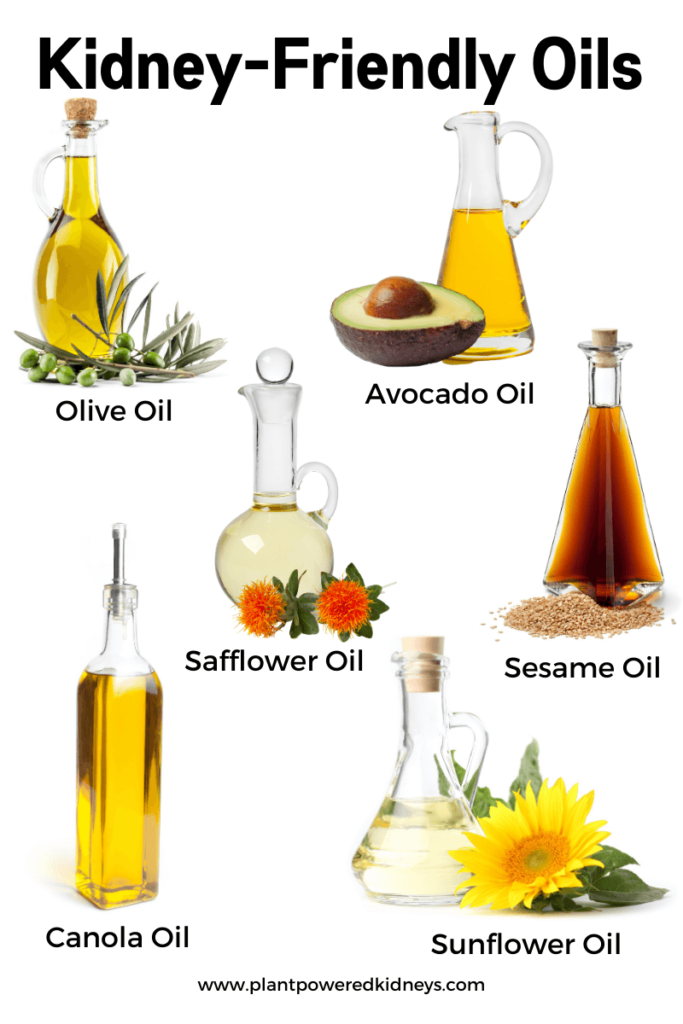
Modify the macronutrients
As discussed earlier, the protein, carb, and fat ratios are quite drastic in the traditional keto diet.
However, it can be helpful to change up those percentages so they are more inline with your kidney health goals rather than weight loss goals. That way, kidney function can be more protected.
Plan out meals and snacks
One of the biggest challenges in sticking with a ketogenic diet absolutely requires a plan. Therefore, meal planning, grocery shopping, and cooking are essential in sticking to a keto diet (or any diet plan for that matter).
Be sure to have healthy snacks planned out and easily available. This can be incredibly helpful when it comes to preparation and satisfying hunger when you don’t have the time or energy to make a meal.
Inform your nephrologist
It’s important to keep your doctor informed about your health, including dietary changes. By discussing your plan with your kidney specialist, they can order labs at preferred intervals to measure your progress.
They’ll also be able to make changes to your medications based on those results. Your prescribed medications are determined by your doctor with the intention to protect your kidneys.
Work with a renal dietitian
By working with a renal dietitian in this process, you’ll have a wealth of knowledge to guide you safely in a keto diet for kidney disease. Your own renal dietitian will help you track lab results and monitor your progress, as well as provide meal and recipe ideas to make it easier for you.
Click here if you need help looking for a renal dietitian in your area.

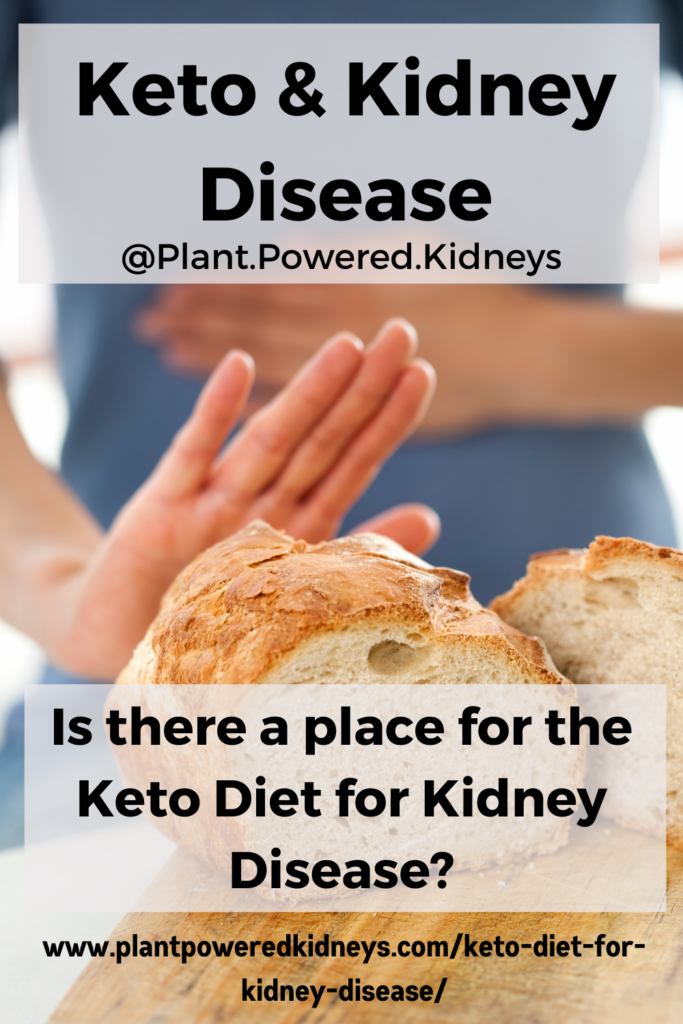
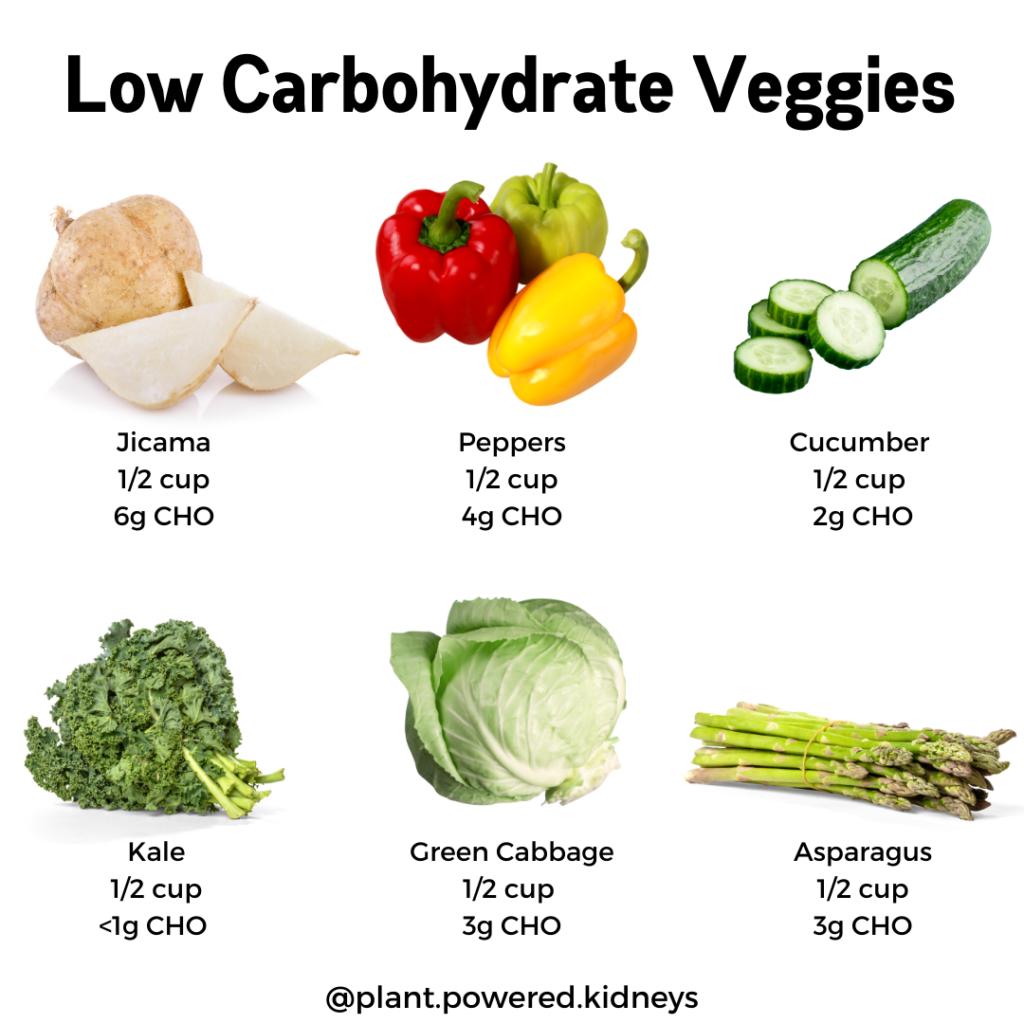
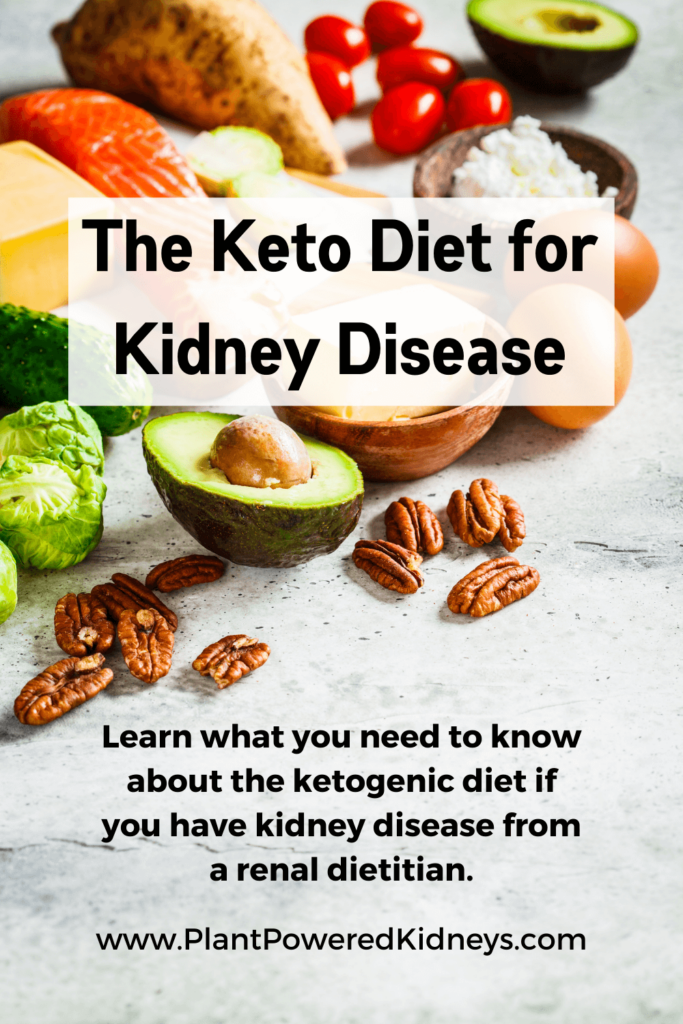
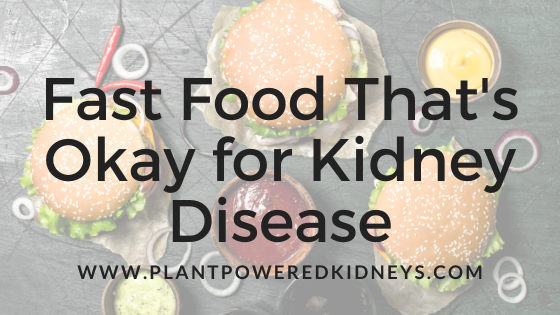
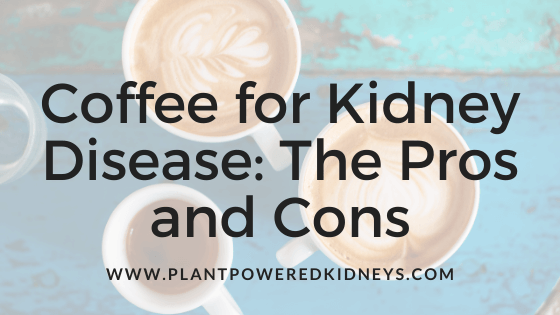
This article did not answer question if Jetgebic diet helping stage 3 renal in ADPKD
I’m sorry, Elinor. I’m not sure I understand what diet you’re mentioning. Can you elaborate?
Would the Factor75 Keto Diet be okay with Chronic Kidney Disease Stage 3? I need to lose 75 pounds.
I’m not familiar with this diet. It would be best to discuss if it’s safe and healthy for you with your healthcare team. 🙂
I am a lifelong Type I diabetic along with my brother and his two sons. At 65, I have a lot of years dealing with diets and exercise and weight management. The first two take care of the third item.
In 2009, I was offered an ‘islet cell’ transplant. I was not over weight, but could have lost 5 lbs just to fit into clothes better. I was told to keep my carbs to no more than 30 for each meal to let the islets form their own blood supply and reproduce. I lost 13 lbs the first month and felt great. No insulin needed.
The trick is to eat more protein and low carb vegetables that still have carbs, but keep them lower and reduce your total caloric intake along with more exercise. Some ideas I found for good tasting food that leaves you with 30 carbs or less per meal is reduced sugar instant oatmeal, lettuce wrapped hamburgers (my first one was from Carl’s Jr., but other do tasty ones upon request and many have them on their menu now. I think taste satisfaction is the key – not quantity. Mozzarella cheese sticks for a snack are good too – they are 100 calories each – so 1-2 is good or for lunch with a few lower carb crackers. Trader Joe’s has some good flavored rice crackers that have low carbs. Hicama is also good cut in strips like fat french fries along with some cucumber dill/yogurt dip you can purchase in the produce departments in most grocery stores. It is better than it sounds.
Thanks for sharing, Lisa! 🙂
I am stage 3 CKD. Not diabetic. Overweight. Can I take “Keto gummies” and still maintain my plant based protein diet without increased for further damage to my kidneys?
Hi Sally! We can’t comment to individual recommendations, but what I’d be curious about (if I were your dietitian) would be what benefit would the gummies provide? I’d also be looking at the nutrition panel and reviewing potential factors like added sugar, added sugar alcohols, protein, potassium, sodium and phosphorus. Out of gate, I’d be hesitant about these…
Sally, did you try the gummies? If so, how did it work for you? My mom has stage 4 kidney disease so I’m curious.
So, the article states that I should change up the macros if I want to do keto with kidney disease, but it doesn’t tell me what I should change the macro ratio to?
This would be something a dietitian would do for you in a comprehensive nutrition assessment to account for everything that makes you special. 💚